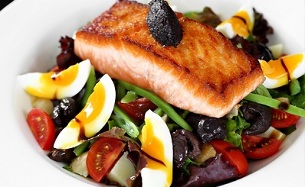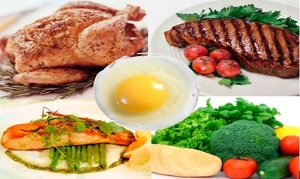How many times have you had to re-read many high-efficiency diets that help get rid of subcutaneous fat? Do you know why there are more than 10, 000 weight loss activities in the world to choose from? It's simple: because 90% of them are invalid. A protein diet for weight loss is a good choice, but if used incorrectly, it may also be ineffective. How to use protein to lose weight without the greatest impact on health?
How to lose weight through protein diet?
To get rid of subcutaneous fat, you need to understand the physical needs of your body, understand when to consume carbohydrates and when-protein, and be able to listen to your body information. If we do the wrong diet, this will provide countless tips.
Of course, most of you already know that if you limit the intake of sweet and complex carbohydrates, it is possible to achieve significant weight loss, depending on the percentage of fat in the body. This can be called a low-carb diet, which is a very effective way to get rid of fat. The calorie deficit produced by minimizing carbohydrate intake will completely replenish fat. This is why people reduce weight by restricting the use of carbohydrates in their diet.
What will happen if we completely eliminate carbohydrates from our diet?
Will we get a better way to lose weight? Our answer: Of course. This diet was particularly popular during the golden age of bodybuilding and was widely promoted by Vince Gironde. You only need to look at his photo and you will immediately understand why he recommended this photo. According to many nutritionists, this is one of the best names. The effective way to burn fat is a protein diet.

The protein weight loss diet is a carbohydrate-free diet that only contains protein foods and healthy fats. The calories of carbohydrates are completely compensated by animal protein. This method can not only eliminate fat as effectively as possible, but also speed up the metabolism and preserve muscle tissue as much as possible.
Many diets actually fail to consider the last two aspects: their main goal is simply to reduce the total daily calorie intake, which does not have a very positive effect on the condition of weight loss.
The human body believes that the sharp reduction in calorie intake is a threat to life, and it starts to slow down the metabolism, and uses muscle fiber to consume energy and transport all consumed food to subcutaneous fat. Therefore, it turns out that at the end of this weight loss method, a person creates ideal conditions for gaining fat and does his best to burn muscle. We hope that now you have lost the desire to try the famous Mono diet?Basic principles of protein diet
When we create an environment where carbohydrates are completely absent, ketone bodies begin to be released from subcutaneous fat, which is the main source of energy for the brain and nervous system.
For the sake of clarity, it is necessary to explain that all the food we eat contains more or less three nutrients, and each nutrient plays its own role in maintaining the life of the body. These are fat, protein and carbohydrates:
- Proteinis the building material of the human body, because it consumes energy in rare cases.
- Fatis energy stored for emergency situations. Fat is also used to protect internal organs.
- Carbohydratesare fully responsible for the energy supply of the human body.
Is it now clearer why we eat sugary or complex carbohydrates when we are hungry? Because carbohydrates are the main energy source of the human body, protein and fat are still retained. Therefore, in daily life, you only want to eat sweet and complex carbohydrates: this is the most effective way to provide energy to the body. This is why people do not like to exclude carbohydrate-containing foods from their diet. The body does not understand that a person deliberately excludes the main source of energy. Your body thinks you are in a bad living environment and expects to be hungry. If carbohydrates do not start to flow in the shortest time, the body will be forced to release emergency reserves of fat.
What happens if you continue to restrict carbohydrate intake?
First, your body will deplete all glycogen reserves. These glycogen reserves will last for a short time. Only after that, it will completely transform from protein and fat to autonomous nutrition. Thanks to this weight loss method, the protein diet has received positive reviews from many people, and these people have achieved incredible results. To be honest, everyone in the food industry has the basis of protein methods to lose weight. Read any diet carefully, and between these two lines, you will see the basics we introduced in this article. Of course, if the diet author you want to read correctly puts forward dietary recommendations.
It is important to add that keeping about 50 grams of carbohydrates in a hard protein diet will not cause a person's blood sugar to rise. This means that the body will continue to feed on adipose tissue to ensure a positive energy balance in the body.
Should we eliminate carbohydrate intake from a protein diet?
This conclusion has many advantages, only one disadvantage. The positive side is that the complete elimination of carbohydrates will lead to the rapid consumption of glycogen storage, which prompts the body to start using fat storage as soon as possible. The reason for everything is our old friend insulin. Its existence determines what kind of energy the body will consume. Everything here is simple: the less carbohydrates you eat, the less insulin you secrete. The surge of this hormone completely prevents the lipolysis process (the breakdown of fat tissue). It can be concluded that a protein diet can eliminate the insulin surge and activate lipolysis.
What are the main disadvantages of a protein diet?
In order to maintain the normal functioning of the digestive system, it is at least necessary to consume fiber. Where is this found? Yes, in carbohydrates. Failure to do so will lead to problems such as constipation, which is completely unpleasant news. Therefore, we strongly recommend that you do not exclude vegetables such as cucumbers, tomatoes and cabbage in your protein diet. They will keep your gastrointestinal tract fully functioning.
The harm of protein diet
The hazards of a protein diet only happen when you start to consume excess protein and completely eliminate fiber from your diet. All these actions will be applied for a long time, and then the body will start to malfunction. We strongly recommend that you consult your doctor and dietitian before using the above options. Because of the large number of diseases, it is unacceptable to eat only protein food. Everyone is in good health and eventually becomes the owner of the most charming character in your city.
How long does the protein diet last?

- There is a variation on the constant use of the diet: For a long time, you only eat protein, healthy fats and fiber.
- Strength dietUse only on training days. About two hours before exercise, you need to supplement carbohydrates to provide glycogen and significantly increase exercise intensity. All other days are protein diets.
- Use a protein diet periodically. This option provides a carbohydrate load once a day throughout the day. This will help maintain muscle mass to the utmost extent and further promote metabolism. We recommend that you use this method for everyone who wants to make their body and spirit fit. Although you can try and choose the most suitable option for yourself.
What can you eat on a protein diet: Food
If we say that these foods should contain animal protein, the answer may not surprise you. It is best to use lean meats such as veal, beef, chicken breast and rabbit. From dairy products, choose foods that do not contain a lot of fat, but you should not only eat low-fat kefir. It is very suitable that the fat content does not exceed 10%. This is normal and there is no need to worry. "Remember, fat burns carbohydrates. " Be sure to eat fish: it is not only high in protein, but also a healthy source of omega fats. Don't forget to use eggs as the benchmark for assimilation in all of the above products.
There should be 5 to 10 meals a day, in fact the more the better. This is why all food must be prepared in the morning and evenly distributed in the bowl: this makes it possible to open the container with the food at any time of the day and consume the required amount of food.
This week’s sample menu
This is what the 7-day protein diet menu looks like, or it can be extended for 14 days.
Monday
- Non-fat cheese packaging;
- A can of yogurt, 1 grapefruit;
- 2 chicken breasts, broccoli, half a cup of kefir;
- A jar of yogurt, grated medium carrots;
- 1 liter of mineral water, a glass of natural apple juice.
Tuesday
- Yogurt, green apple;
- 1g 100g of any meat, cheese, tomato, sweet pepper;
- 200 grams of fish, celery salad, carrots and ½ apple;
- 2 boiled eggs, cabbage salad with parsley and lemon juice;
- 1 liter of water, 1 cup of gooseberry juice.
Wednesday
- Yogurt, a cup of strawberries;
- Granular cheese, plus a tablespoon of chopped parsley, red pepper and tomato sauce;
- 2 chicken breasts, a cup of spinach, half a cup of kefir;
- Any stew, zucchini, 1 tomato, 2 tablespoons of dill (you can mix vegetables and add 2 tablespoons of olive oil), 2 slices of ham;
- 1 liter of water, a glass of orange juice.
Thursday
- Non-fat cheese packaging;
- a cup of kefir, 1/2 cup of raspberries;
- 200 grams stew, 1/3 cup milk, carrots;
- 2 eggs, cabbage salad with chili powder and parsley, seasoned with lemon juice;
- 1 liter of water, a cup of gooseberry juice.
Friday
- yogurt, two oranges;
- Granular cheese (1 pack);
- 200 grams of sea fish, tomato, red pepper and parsley salad, yogurt;
- Granular cheese (1 pack), carrots, green apples;
- 1 liter of water, a glass of orange juice.
Saturday
- 100 grams of cheese, skimmed milk;
- A glass of kefir;
- 2 chicken breasts, beans, yogurt;
- 2 slices of ham, broccoli, 1 egg, 2 tablespoons of corn;
- 1 liter of water, a cup of gooseberry juice.
Sunday
- a cup of kefir, 1/2 cup of raspberries (or other berries);
- Grainy curd, sliced ham;
- Stewed chicken liver, lettuce in lemon juice, apple;
- Yogurt with fruit;
- 1 liter of water, a glass of apple juice.














































































